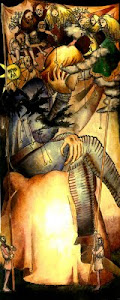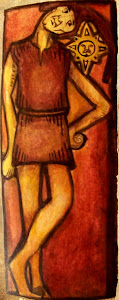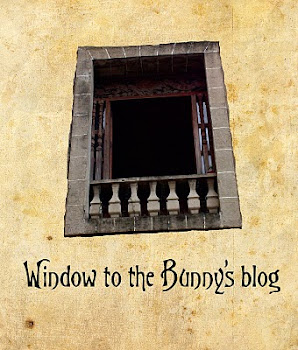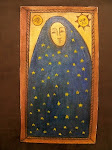
Last time, you saw my pen and ink illustration of my mother's family tree for my second plate in my Advanced Figure Illustration class. For that cause, she gave me the full list of her direct relatives in their clan, including her cousins and the children of her cousins although she didn't know exactly their stories and histories in full detail.
Actually, mother hardly tells much of her stories about her past and her family. All I know is that she is the youngest among the thirteen children of my grand parents, which I never met personally, and that she was the only one who was fortunate enough get into a college. She said that it was because her siblings only wanted to spend their time in the fields, harvesting rice from their vast land.
Later on, fortunately, she gradually told me her past, as well as those of the other members of the family when I asked her about their family tree. I want to compile those stories as one in here, because mother didn't talk about the stories in just one seating (unlike my father who usually does that), and usually she refuses to talk about it too long. Perhaps because she doesn't like storytelling. One of the events that maybe made her tell some of those buried details was the recent wake for my grandmother's sister, who passed away this month. She attended the funeral of the last of the children of my great grand parents, along with her siblings and her cousins, who, according to her, possessed dubious personalities. So I grabbed this opportunity to ask her about them and the funeral.
So, let me start her story.
She was born from very kind and gentle parents, Mercedes and Eulogio, who had set up their own land in our present province, in Tarlac, away from their parents from another town. I think my grand parents hometown was different from their parents, that is, my great grand parents. I recently researched my mother's ancestors through the net and other documents. What I found is that most of my mother's supposed direct ancestors, dating back to the middle of the 19th century, was in the town of Pampanga, a few kilometers away from Tarlac. Though I'm not sure of the full details, this may suggest that my grandparents moved and settle on their own land, since my mother also told me that her grandparents didn't live in Tarlac in the first place.
Back to my mother, she was very special for her parents, as well as to her siblings since she is the youngest amongst the thirteen children. They gave her everything she needed, and, perhaps, also everything that she wanted. And in return, she served her parents and siblings, though not in the rice fields, but household chores and education
.
 She had an aunt named Carmela, which she never dared to visit due to the woman's very, very strict and moody behavior. She was this aunt of hers who passed away this month. Her cousin's children, who took charge the funeral, also had a very very unpleasant attitude. So unpleasant that I don't want to talk about them all, but perhaps except for one. Her grand children inherited the same attitude. Her grand children, who have become very successful people, didn't want any children playing around where they were staying, and they even discriminated against their own aunts! So even if I didn't meet them in person, I can feel what mother felt about them as she recounted this. In this illustration though, Carmela's attitude is not related to what she is doing here.
She had an aunt named Carmela, which she never dared to visit due to the woman's very, very strict and moody behavior. She was this aunt of hers who passed away this month. Her cousin's children, who took charge the funeral, also had a very very unpleasant attitude. So unpleasant that I don't want to talk about them all, but perhaps except for one. Her grand children inherited the same attitude. Her grand children, who have become very successful people, didn't want any children playing around where they were staying, and they even discriminated against their own aunts! So even if I didn't meet them in person, I can feel what mother felt about them as she recounted this. In this illustration though, Carmela's attitude is not related to what she is doing here.My mother got into high school, and then to college in Baguio, far away from her hometown, where she graduated with honours. She even became teacher in her college after she graduated. Then she met father and they moved to the city, and set up their own land, though she still visits her siblings in Tarlac, where she and father once left my eldest sister Joyce for a while there when my sister was quite young.


Then, her siblings started to have families, except for the unmarried ones like Aunt Rosalinda--who lived in their original house, puffing unfiltered cigarettes while playing solitaire. My uncle Antonio also has no wife and lives with aunt Rosalinda. But most of the time he goes out early in the morning to visit their rice fields and guard them, or, according to him, to hunt birds or small animals in woods with his pump shotgun. But, they are very kind people, and among my aunts and uncles, those two are much closer to me, and perhaps to my siblings also. As you can see, I put a cigarette in my aunt's hands and a gun in my uncle's.
 Their farm is a vast one, owned by my grandparents. But, something terrible happened to it. One of their sibling, uncle Aniceto, gradually sold their lands for a very cheap price,and without permission to those who rightfully inherited the lands. Like aunt Carmela, uncle Aniceto is a moody man. They complained about what their brother did, but sadly it was never resolved. And even my mother's share to the land was sold, all of her shares. But mother, who didn't want any trouble, just ignored it. And because she lived with father, she didn't much put attention to the conflict. I put a pouch of silver to signify he his betrayal in selling the major parts of their land secretly.
Their farm is a vast one, owned by my grandparents. But, something terrible happened to it. One of their sibling, uncle Aniceto, gradually sold their lands for a very cheap price,and without permission to those who rightfully inherited the lands. Like aunt Carmela, uncle Aniceto is a moody man. They complained about what their brother did, but sadly it was never resolved. And even my mother's share to the land was sold, all of her shares. But mother, who didn't want any trouble, just ignored it. And because she lived with father, she didn't much put attention to the conflict. I put a pouch of silver to signify he his betrayal in selling the major parts of their land secretly.My mother's sisters and brothers usually have some conflict with one another, from the very tiniest of problems to the larger ones, and usually my mother tries not to meddle in such squabbling. But ironically, during their childhood days, they were kind to each other. Perhaps this is because, now that their parents are dead, no one can solve their problems, which is very sad to think about.
Speaking of family affairs and kinfolks, I am currently working on my thesis about families and clans due next year. Well, I also just recently realized that this is a not such an easy task as I have thought it would be, despite of my interest in the topic.






























